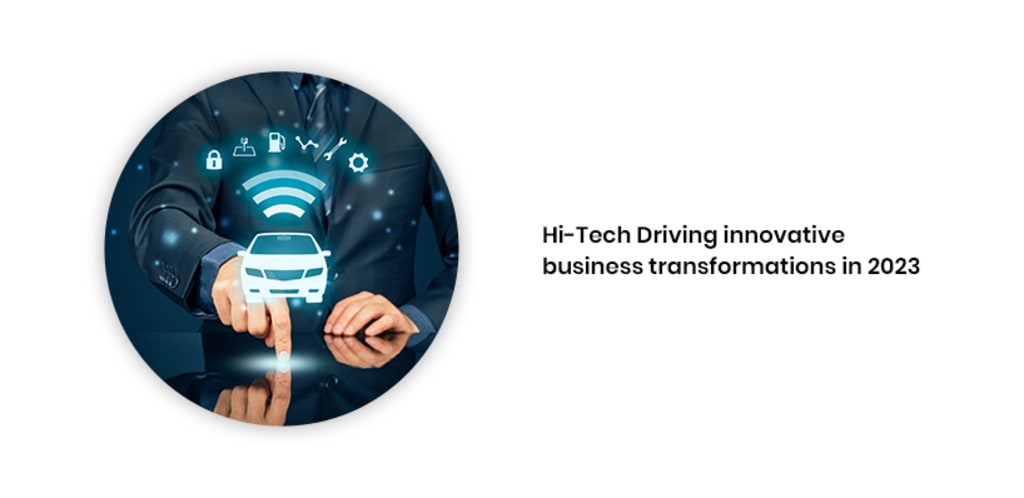Hi-Tech Driving Innovative Business Transformations in 2023
Today's hi-tech businesses use a wide range of technologies to increase business value. These technologies can be linked together in many ways.

High-tech businesses, particularly semiconductors, have shorter product life cycles and need better customer support to be competitive.
Companies are destroyed by inefficient processes and poorly integrated systems, especially in the digital age, when customer demands and technologies change rapidly.
High-tech companies are using digital transformation to streamline their business processes and implement disparate digital initiatives.
They use big data to aid collaboration and information through digital channels within their value chain.
This new value circle leverages the automation of local performance, consolidated at a global level, and ensures business knowledge.
The three main segments of the high-tech sector can be broken down into:
- Original Equipment Manufacturers
- Semiconductor Technologies
- Software Companies
Although the evolution of high-tech solutions was slow, it is now the most powerful. It has experienced accelerated internal development and brought about a transformation in non-adjacent and adjacent sectors.
The top Hi-Tech Industry trends of 2023
Today's hi-tech businesses use a wide range of technologies to increase business value. These technologies can be linked together in many ways. These include:
Cloud Transformation
Cloud transformation refers to transforming an organization's IT infrastructure and application lifecycle to meet its customers' needs. Collaboration is key to cloud transformation. It requires collaboration between business units and departments within an organization to find ways to share resources more efficiently and open up avenues for collaboration to facilitate innovation.
Cloud transformation is an operational approach to technology and data. It allows organizations to transform their data and bring complex solutions into existence in ways that would take months or even years using traditional resources. It's about making information sharing and processing frictionless and secure. Data today supports complex business logic, enabling new business opportunities and reducing costs. This is why hi-tech businesses must make data a priority.
You can make it happen in many different ways. A shift in IT policy or business strategy is the first step to transformation. Each organization will face unique challenges as they move to the cloud. Open source, microservices and cloud data centres are key modern practices. To stay competitive, hi-tech companies must incorporate new technologies into their systems to maintain value and reduce IT drift.
Vision-Driven, Customer-Centric Approach
Companies have focused on increasing revenue and maximizing the bottom line for a long time. Companies are increasingly focusing on customer experience as they seek to differentiate themselves by leveraging data, analytics and real-time customer insights. Businesses cannot just out-innovate one another; they must also be competitive in providing a better customer experience.
Customer experience processes like onboarding, retention marketing and cross-selling will become more sophisticated. The emphasis is on making customers happy.
As customers become more aware of brands and services, the positioning of their product and service offerings is rapidly changing. This is already happening with loyalty programs with a greater interactive component and better measurement tools. This change is inevitable and will have a significant impact on the way hi-tech businesses market and provide services.
Over the last five years, customer experience marketing has significantly increased. Companies are increasingly using data-driven and user-centred marketing strategies to improve the customer experience while automating customer service. As hi-tech companies continue to look towards AI, this trend will only grow as they embrace the technology to help with complex tasks like onboarding new clients and ignoring technical underpinnings.
AI for Software and Services
AI technology isn't being used to solve all problems in every industry. It is used to improve existing solutions, create new solutions as needed, and accelerate technology adoption in new areas. Large companies use it to create ad campaigns that target specific content on a wide range of search engines. They also save time and money by using intelligent ad technology.
According to Gartner, over 70% of businesses plan to implement AI. 14% have implemented AI in their current business processes.
Large sectors are already adopting AI-based hi-tech solutions. AI is already used in retail to improve shelf life and inventory management. AI is expected to become a major hi-tech trend by 2023. It will allow for improvements in product design, marketing, and customer engagement.
Hi-tech companies are investing heavily in AI to improve their efficiency and that of their suppliers. AI-powered software allows businesses to perform analytics without the need for staff. This tech can be used for security checks and customer service automation. Some agencies are using technology to reduce costs and speed up their service. Companies are also looking at how AI can be used to reduce human error and improve security in their infrastructure.
Automation
Automated systems can perform more tasks than human workers and replace them with routine tasks when necessary. Software and software-based technology won't replace human creative thinkers or problem solvers. Still, it could be a category that supports creative output when human impulse control is limited.
Automation plays an essential role in improving the efficiency and effectiveness of your organization. Automation allows companies to delegate tasks more effectively and respond faster to changing situations.
Hi-tech companies can add significant value to their work by automating routine and semi-routine tasks. This will allow for more human creativity and innovation and accelerate business process operations. Technology can be easily transferred from one place to the next: The faster technology is developed, the more quickly it can be implemented. Automation does not mean just programming computers to do your work, although that is an essential application of AI. Automation can also use software tools to generate business value from textual data.
Digital Workplace
The digital workplace will allow for new business models that reduce costs, increase efficiency and give employees more freedom.
New social media platforms, connected databases, professional interactives, and shared workspaces have created new opportunities for teams to collaborate and plan in new ways. Digital Workplace will remain a leading provider of virtual workspace solutions to organizations of any size that want to connect online and offline.
Digital Workplace's mission is to transform how organizations manage and build digital assets. Hybrid teams will work with traditional units, and digital assets will be stored on-premises. This will create value for both businesses and hi-tech.
Modernizing the Hi-Tech Supply Chain
Cloud Supply Chain Management (SCM) has been a major trend in hi-tech supply chains over recent years. This trend will only continue. It's simple. Instead of tracking your stuff physically, you can manage it from multiple locations using one central platform. It is about keeping track of transactional and delivery information from points A to B without touching any items.
Despite widespread adoption, many companies are still unable to realize the potential of cloud-based SCM fully. However, the benefits outweigh the cost for most companies. Cloud-based SCM can provide many benefits beyond cost savings. It can also increase innovation, engagement, productivity, and global expansion.
Internet of Things (IoT)
The IoT is a major driver for both the hi-tech sector and the global economy as more and more devices are connected and operate using hitech IT services. Sensors, robots, and other systems are increasingly powering the Internet of Things (IoT). They perform functions such as security, transport, and energy management. This has created new opportunities for economic growth, convenience, and safety benefits. Future IoT will have many interconnected devices and systems, as well as more processing power for those applications that need it.
IoT deployments are moving at an increased rate across all industries. Every new generation of connected devices depends on wireless networks to reach users. Every industry seeks ways to control and manage the IoT data that flows through its systems. This technology is being developed by the hi-tech sector, which includes users and providers.
Blockchain Technology
It is a categorized ledger which extends the ability to induce trust, transparency and security to transactions, from smart contract management to supply chain management.
Businesses increasingly use blockchain to secure transactions and verify product authenticity.
Blockchain will be a major hi-tech technology in the future, as security, privacy, and precision become more important than ever amid the data flood.
Conclusion
Digital transformation is essential for hi-tech companies. This requires continuous experimentation to improve business outcomes. Innovation is key to driving a hi-tech company forward. Innovation can lead to new products, services, or business models. The Hi-Tech industry has seen explosive growth. Technology companies that offer services previously available only to large corporations are winning new clients.
Digitization will dominate the future of hi-tech businesses. This transformation will open up millions of new possibilities and bring about profound changes in how we live, work, and interact. The entry of agile new entrants will disrupt established industries. All corners of the globe will be affected by innovation.
Innovation in hi-tech is constantly changing. Every company, regardless of size, must be able to predict its future.
Hi-Tech is driving businesses around the globe to transformation and growth. As business models evolve, IT applications must adapt to meet the new norm. They need a strategic roadmap and implementation services to fuel growth and use transformative technology. A high-tech consulting partner like CIS, which has deep technology knowledge, reference architectures and a proven methodology that caters to specific hi-tech requirements, can positively impact an organization.






Comments
There are no comments for this story
Be the first to respond and start the conversation.